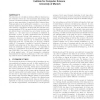208 search results - page 38 / 42 » Robust Kernel Principal Component Analysis |
ICPR
2004
IEEE
14 years 8 months ago
2004
IEEE
Most face recognition approaches either assume constant lighting condition or standard facial expressions, thus cannot deal with both kinds of variations simultaneously. This prob...
SIGMOD
2004
ACM
14 years 7 months ago
2004
ACM
The detection of correlations between different features in a set of feature vectors is a very important data mining task because correlation indicates a dependency between the fe...
ICRA
2007
IEEE
14 years 1 months ago
2007
IEEE
Abstract— Many computer vision problems such as recognition, image retrieval, and tracking require matching two images. Currently, ones try to find as reliable as possible match...
ICB
2007
Springer
14 years 1 months ago
2007
Springer
Recent studies have shown that shape cues should dominate gait recognition. This motivates us to perform gait recognition through shape features in 2D human silhouettes. In this pa...
PCM
2007
Springer
14 years 1 months ago
2007
Springer
The two-dimensional Principal Component Analysis (2DPCA) is a robust method in face recognition. Much recent research shows that the 2DPCA is more reliable than the well-known PCA ...

